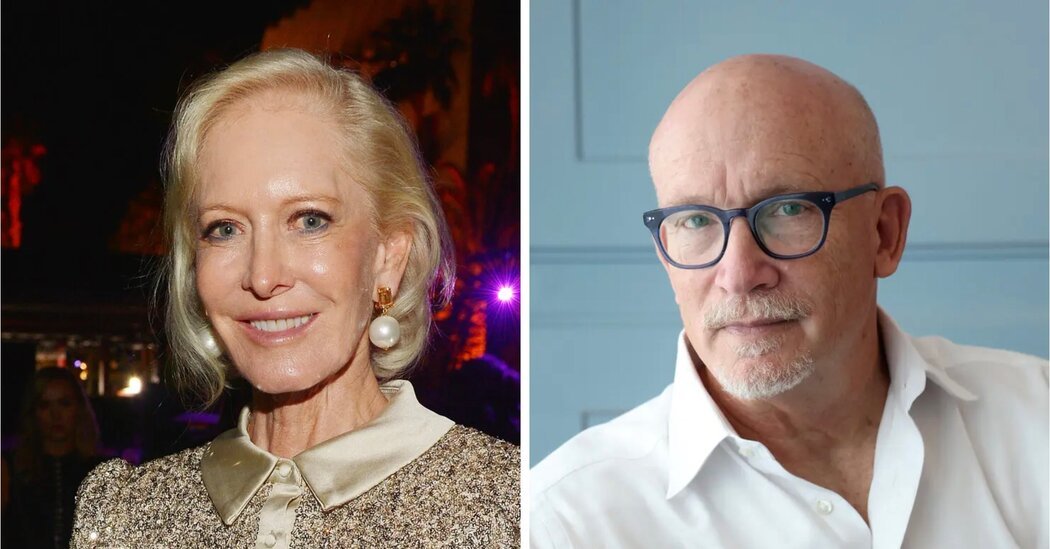Documentarian Alex Gibney Teams Up With a Google Billionaire
At a time when the documentary film business is atrophying, one of the world’s leading documentarians, Alex Gibney, has taken on a powerful partner: Wendy Schmidt, a billionaire philanthropist by way of Google.
“We’ve been managing to make films on important social issues for a long time, but finding and getting those stories to audiences has been a challenge, in part because of the consolidation of the entertainment industry,” Mr. Gibney said in a video interview on Wednesday. “By partnering with Wendy, we’re making sure that Jigsaw is around for the long haul,” he added, referring to his company.
Mr. Gibney, 71, said he had sold a majority stake in Jigsaw Productions to Ms. Schmidt, who is married to Eric Schmidt, the former chief executive of Google. Mr. Gibney will continue to run the company, which has produced more than 80 films since the early 2000s. Those include “Enron: The Smartest Guys in the Room,” “Going Clear: Scientology & the Prison of Belief,” “The Inventor: Out for Blood in Silicon Valley” and the Oscar-winning “Taxi to the Dark Side,” about the use of torture by the United States in its “war on terror.”
Jigsaw, which turns a profit, according to Mr. Gibney, also has a nonfiction TV business (more than 200 episodes produced) and a growing podcast division. Jigsaw is based in New York and currently employs 15 people.
Financial terms were not disclosed.
Ms. Schmidt, 69, said in a video interview that Jigsaw would broaden its editorial focus to include more stories on climate change and ocean health, topics that have been central to her family’s philanthropy. She said that her goals for Jigsaw included deepening “impact storytelling and public interest journalism,” along with helping the company find “more innovative distribution options,” which could include virtual reality experiences.
“This is about trying to assume a mantle, a role that we think is a vital one in the film business,” Ms. Schmidt said. “Documentary film is such a powerful tool, especially today with the division in our society.”
“Human society, in my view, is at an inflection point,” she continued. “We are existentially threatened by the technology we’ve created as well as by the failure of systems on the planet to support us because they’ve become so compromised.”
Ms. Schmidt’s investment will allow Jigsaw to hire more staff and expand to Los Angeles. Already, Jigsaw has brought on Courtney Sexton, a former senior executive at Participant Media, which had long been Hollywood’s pre-eminent maker of socially conscious entertainment until shutting down last year. (Ms. Schmidt said that she had made an offer for Participant that would have saved the company, but that the owner rejected it.)
Documentary companies like Jigsaw rely on studios and streaming services to distribute their content. Such partners have cut back — especially on social justice topics — in the face of continuing weakness at the box office, higher labor costs and increased profit pressure from Wall Street.
Streaming services like Disney+ and Netflix have started to sell ads, and advertisers prefer easily digestible, apolitical content. Although “No Other Land,” an independently produced film about the Israeli-Palestinian conflict, is viewed as the front-runner for best documentary at the coming Academy Awards, the documentary has been unable to secure distribution in the United States.
Over the years, Ms. Schmidt has been an executive producer of various documentaries, including “The Hunting Ground,” about rape on college campuses, and “Gather,” about Indigenous people in the United States working to reclaim the food systems of their ancestors. In buying Jigsaw, she is in some ways following another philanthropic heavyweight from Silicon Valley: Laurene Powell Jobs, the widow of the Apple co-founder Steve Jobs. In 2020, Ms. Powell Jobs helped the Oscar-winning documentarian Davis Guggenheim (“An Inconvenient Truth”) and a partner start Concordia, a studio for documentaries.
“When you tell me a story that captures my imagination and my heart — shows me courage, shows me inspiration, shows me human connection to something bigger than myself — I’m going to listen to you and follow you,” Ms. Schmidt said. “That’s the promise that we see in this arrangement.”
However, she added, “it is a business. And I will treat it as a business.”




Post Comment